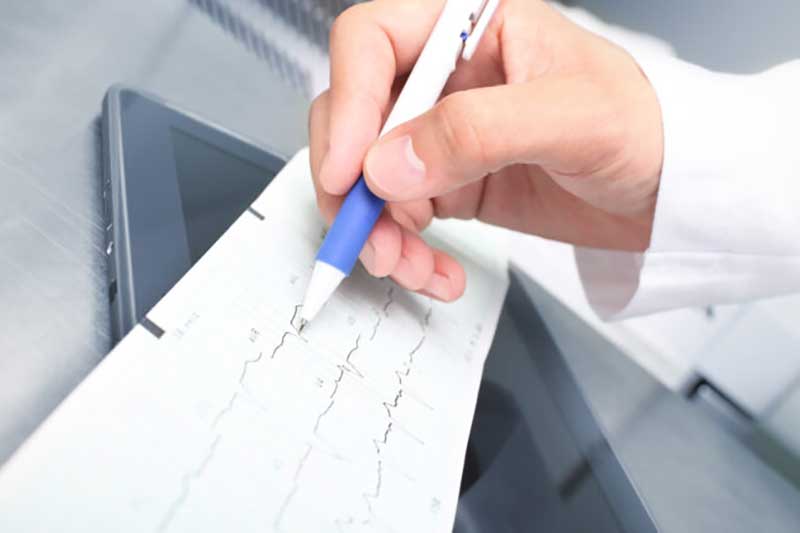Do you have an interest in medicine? If so, you can turn a passion for science and heart health into an exciting new career as an EKG technician. You will work side-by-side with doctors to diagnose and treat diseases and disorders like cardiovascular disease. Training takes months, not years, and the versatile skills you will develop will last a lifetime.
What Is an EKG?
Developed by Dutch physician and researcher, William Einthoven, an EKG is a test that maps the heart’s electrical activity. As voltage flows through each of its four chambers, the upper atria and lower ventricles, the electrocardiograph captures its movement, recording it as a wave pattern called a tracing. Changes in the waves tell doctors how the heart is functioning.
What Do Doctors Learn from EKGs?
Electrocardiograms are one of many tests used to evaluate heart function. They can pinpoint a wide range of disorders, including:
- Dysrhythmias
- Ischemia
- Cardiomyopathy
- Heart failure
- Electrolyte imbalances
- Heart attack
An EKG is often the first test ordered to rule out heart conditions as the cause of symptoms, such as shortness of breath, fatigue, dizziness, and chest pain. The procedure is quick, inexpensive, and painless.
What Does an EKG Technician Do?
EKG technicians work in doctors’ offices, hospitals, clinics, and other medical facilities, performing electrocardiograms with minimal supervision. The role includes patient preparation, testing, aftercare, and recordkeeping.
What Will You Learn in an EKG Technician Program?
EKG technician programs are laser-focused on the basics of electrocardiography. Programs are short but intense. Topics include:
Medical Terminology
Medicine has a unique language. A terminology class won’t make you fluent, but it will teach you how to figure out what words mean by breaking them down into parts. You’ll learn how prefixes, suffixes, and root words are joined together to make complex terms that say more with fewer words. Medical language and accepted medical abbreviations related to electrocardiograms. By the end of the course, you’ll know that “cardio” means “heart” and “ology” means “the study of,” cardiology is the study of the heart. . With experience, medical terminology will roll off your tongue.
Anatomy and Physiology
With an emphasis on the cardiovascular system, you will learn the Anatomy of how the body is made, and the Physiology of how it works. Presented with an emphasis on heart health, it’s the key to understanding the scientific basis of EKGs. You’ll learn how the heart functions, how cardiac disorders impact the body, and how they’re treated.
How to Perform EKGs
You will learn the principles of EKGs in the classroom followed by hands-on training in the lab and real-world practice. Graduates will be prepared to perform 12-lead EKG, check pacemakers, place Holter monitors, and troubleshoot tracings, using the same advanced equipment you will encounter in the field.
You’ll also dive into patient care, learning how to physically and mentally prepare patients of all ages and capabilities for testing. Additional topics include equipment safety and infection control principles. In healthcare, it’s safety first.
Rhythm Interpretation
EKG technicians don’t diagnose disease. But they may do dozens of tests per day, serving as the eyes of the cardiologist. It’s important they can recognize a dangerously abnormal heart rhythm. An alert EKG technician will know which tests the doctor should review immediately and which can wait. It’s a critical part of ensuring prompt care.
Records Management
EKGs change over time, so doctors keep a careful record of past results for comparison. Subtle changes are more meaningful when the cardiologist is sure a patient’s heart was normal. The EKG technician is responsible for entering test results into the computer system and altering the doctor when there are tracings to be read.
Professionalism and Ethics
Healthcare is a highly responsible, regulated field. EKG technicians must be well-versed in the legal and ethical considerations that govern their jobs. HIPAA, for example, the Health Insurance Portability and Accountability Act of 1996, drastically changed the way private health information can be shared. Violations can result in financial sanctions for facilities and job loss for employees. This course helps students to practice safely, protecting themselves and their employers from liability.
The EKG Technician’s Role
EKG training programs cover all of the skills necessary to perform an electrocardiogram from start to finish, including:
Equipment Preparation
EKG technicians are responsible for sanitizing exam rooms and doing quality control checks on equipment before patients are seen. An electrocardiograph is an electrical device, so other currents in the room can interfere with tracings. Fans, air conditioners, cell phones, and other devices may have to be turned off depending on equipment sensitivity.
Ensuring that exam areas are functional and comfortable helps patients relax. A busy cardiology practice may do dozens of EKGs daily. Efficiency helps the schedule run smoothly.
Patient Education
Having an EKG will be familiar to some patients, but for others, it’s a new experience. Before performing the procedure, the EKG technician explains how the test will be performed, reviewing precautions and expectations. Avoiding artifacts on an EKG requires patients to stay still, so it’s best to avoid surprises. Discussing it in advance demystifies the testing process and puts patients at ease.
Prescreening
EKG technicians prescreen patients for physical limitations and other factors that could affect the test process. People with heart failure, for example, have difficulty breathing when they lay flat and may need to have their heads elevated. Clients with mobility or cognitive issues may require special accommodations, some may need hands-on positioning assistance, and children, as always, need a gentle touch.
In some cases, cardiac medications are withheld for up to 24 hours before testing because they can cause benign abnormalities that may be mistaken for disease. The EKG technician reviews the cardiologist’s order with patients to ensure all directions have been followed.
Patient Preparation
Physical preparation for an EKG is simple but critical for achieving optimal results. The EKG technician:
- Reminds clients to remove metal jewelry, watches, and body piercings that can interfere with the tracing
- Offers loose-fitting garments that make electrode placement more convenient
- Assists patients onto the exam table, safely positioning them for stability and comfort
- Ensures patient privacy by closing doors, blinds, and curtains
- Shaves the body hair where electrodes will be applied, cleansing the skin so pads adhere firmly
Testing
There are several types of EKGs that technicians regularly perform. The three most common are:
12-Lead EKG – the most common EKG uses 12 leads and gives doctors a horizontal and vertical view of how the heart is working. Done with the patient at rest, it takes about ten minutes to perform.
Holter Monitoring – mobile EKG devices, known as Holter monitors, can be worn from days to weeks to catch abnormalities that a limited EKG can miss. Smaller than a deck of cards, they stick to the patient’s chest, discretely monitoring their heart rate and rhythm as they go about their daily routine. EKG technicians place the device and advise patients how to use them based on their doctor’s order.
Stress Test
EKGs are also part of stress testing, a comprehensive exam that shows how the heart functions while patients exert themselves, walk on a treadmill, or pedaling a stationary bike. For safety, stress tests are usually supervised by doctors but prepared by EKG technicians who will help patients navigate the process.
The basic steps for all types of EKGs are similar:
EKG technicians place electrode pads on the patient’s body, avoiding placement over bone or irritated skin. Next, they attach the color-coded leads that transmit the tracing. Loose leads create artifacts, distortions in the waveform, so they must be secure. EKG technicians then cue patients to take a deep breath, holding it while the test is completed. Tracings with significant artifacts may need to be redone.
EKG technicians don’t interpret EKGs, but with experience, they learn which abnormalities indicate an impending health crisis. Normal or expected results are entered into the medical record for the doctor to review, but unusual findings should be reported immediately.
Aftercare
When the EKG is complete, the technician removes the electrodes and pads. Before patients leave, they answer questions, explain when to expect results and who to contact if they develop worrisome symptoms. Disposable supplies are discarded per infection control protocols. And the room is then sanitized for the next patient. It’s a fast-paced but cautious work environment.
Final Thoughts
Want to Learn More?
Now that you know what an EKG technician does, it is time to learn more about ATA College. This Electrocardiogram Technician training course prepares individuals, under the supervision of physicians and nurses, to administer EKG and ECG diagnostic examinations and report results to the treatment team. Due to the accelerated nature of the EKG technician program, there is a prerequisite of either graduating from a Medical Assistant program or have working experience in the healthcare field. Upon completion of this course, ATA College students will be eligible to take the national certification exam.
Contact us today to learn more about EKG technician career opportunities offered at ATA College.





